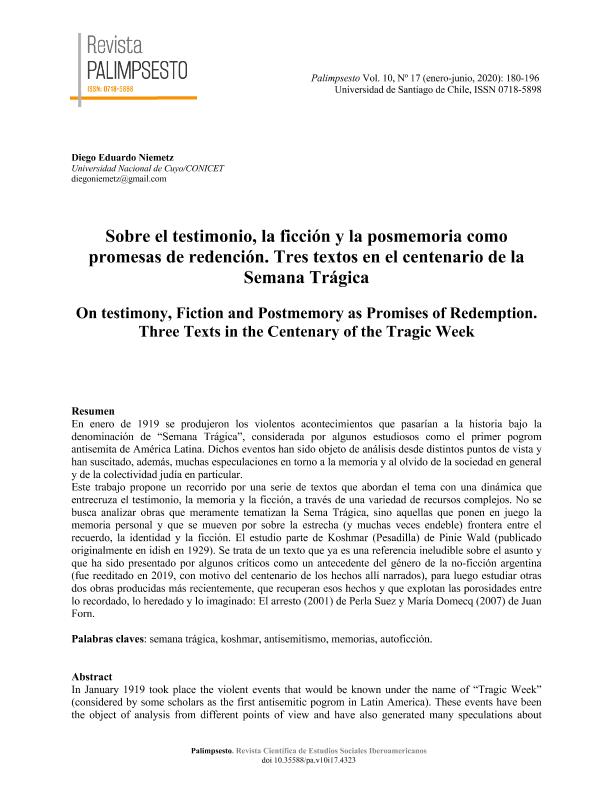Mostrar el registro sencillo del ítem
dc.contributor.author
Niemetz, Diego

dc.date.available
2022-10-20T12:09:13Z
dc.date.issued
2020-05
dc.identifier.citation
Niemetz, Diego; Sobre el testimonio, la ficción y la posmemoria como promesas de redención: Tres textos en el centenario de la Semana Trágica; Universidad de Santiago de Chile. Facultad de Humanidades; Palimpsesto; 10; 17; 5-2020; 180-196
dc.identifier.issn
0718-5898
dc.identifier.uri
http://hdl.handle.net/11336/174067
dc.description.abstract
En enero de 1919 se produjeron los violentos acontecimientos que pasarían a la historia bajo la denominación de “Semana Trágica”, considerada por algunos estudiosos como el primer pogrom antisemita de América Latina. Dichos eventos han sido objeto de análisis desde distintos puntos de vista y han suscitado, además, muchas especulaciones en torno a la memoria y al olvido de la sociedad en general y de la colectividad judía en particular. Este trabajo propone un recorrido por una serie de textos que abordan el tema con una dinámica que entrecruza el testimonio, la memoria y la ficción, a través de una variedad de recursos complejos. No se busca analizar obras que meramente tematizan la Sema Trágica, sino aquellas que ponen en juego la memoria personal y que se mueven por sobre la estrecha (y muchas veces endeble) frontera entre el recuerdo, la identidad y la ficción. El estudio parte de Koshmar (Pesadilla) de Pinie Wald (publicado originalmente en idish en 1929). Se trata de un texto que ya es una referencia ineludible sobre el asunto y que ha sido presentado por algunos críticos como un antecedente del género de la no-ficción argentina (fue reeditado en 2019, con motivo del centenario de los hechos allí narrados), para luego estudiar otras dos obras producidas más recientemente, que recuperan esos hechos y que explotan las porosidades entre lo recordado, lo heredado y lo imaginado: El arresto (2001) de Perla Suez y María Domecq (2007) de Juan Forn.
dc.description.abstract
In January 1919 took place the violent events that would be known under the name of “Tragic Week” (considered by some scholars as the first antisemitic pogrom in Latin America). These events have been the object of analysis from different points of view and have also generated many speculations about memory and oblivion of society in general and in the Jewish community in particular. This paper considers three texts that approach the subject with a dynamic that interweaves testimony, memory and fiction, through a variety of complex resources. In other words, we do not seek to analyze works that merely thematize the “Tragic Week”, but those that put personal memories in scene and that move over the narrow (and often slippery) border between memory, identity and fiction. The study starts from Koshmar (Nightmare) by Pinie Wald (originally published in Yiddish, in 1929). This text is an unavoidable reference on the matter and has been presented by some critics as an antecedent of Argentine non-fiction (it was reissued in 2019, on the occasion of the centenary of the events narrated). Then will consider more recently produced works, that recover those facts trough the porosities between the remembered, the inherited and the imagined: El arresto (2001) by Perla Suez and María Domecq (2007) by Juan Forn.
dc.format
application/pdf
dc.language.iso
spa
dc.publisher
Universidad de Santiago de Chile. Facultad de Humanidades
dc.rights
info:eu-repo/semantics/openAccess
dc.rights.uri
https://creativecommons.org/licenses/by/2.5/ar/
dc.subject
SEMANA TRÁGICA
dc.subject
KOSHMAR
dc.subject
ANTISEMITISMO
dc.subject
MEMORIAS
dc.subject
AUTOFICCIÓN
dc.subject.classification
Literaturas Específicas

dc.subject.classification
Lengua y Literatura

dc.subject.classification
HUMANIDADES

dc.title
Sobre el testimonio, la ficción y la posmemoria como promesas de redención: Tres textos en el centenario de la Semana Trágica
dc.title
On testimony, fiction and postmemory as promises of redemption: Three texts in the centenary of the Tragic Week
dc.type
info:eu-repo/semantics/article
dc.type
info:ar-repo/semantics/artículo
dc.type
info:eu-repo/semantics/publishedVersion
dc.date.updated
2022-09-13T17:23:40Z
dc.journal.volume
10
dc.journal.number
17
dc.journal.pagination
180-196
dc.journal.pais
Chile

dc.journal.ciudad
Santiago de Chile
dc.description.fil
Fil: Niemetz, Diego. Consejo Nacional de Investigaciones Científicas y Técnicas. Centro Científico Tecnológico Conicet - Mendoza; Argentina. Universidad Nacional de Cuyo. Facultad de Filosofía y Letras; Argentina
dc.journal.title
Palimpsesto
dc.relation.alternativeid
info:eu-repo/semantics/altIdentifier/doi/http://dx.doi.org/10.35588/pa.v10i17.4323
dc.relation.alternativeid
info:eu-repo/semantics/altIdentifier/url/https://www.revistas.usach.cl/ojs/index.php/palimpsesto/article/view/4323
Archivos asociados
